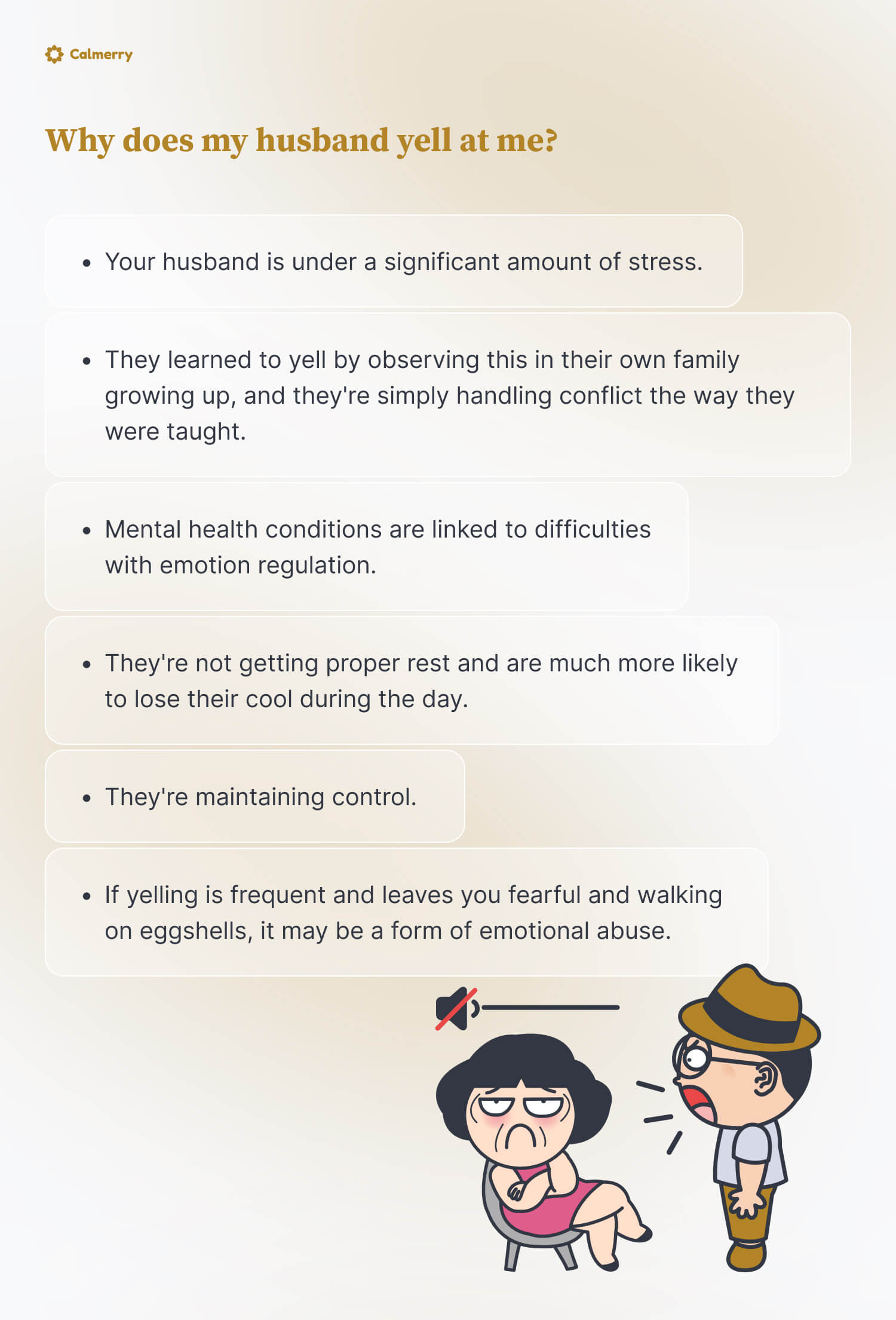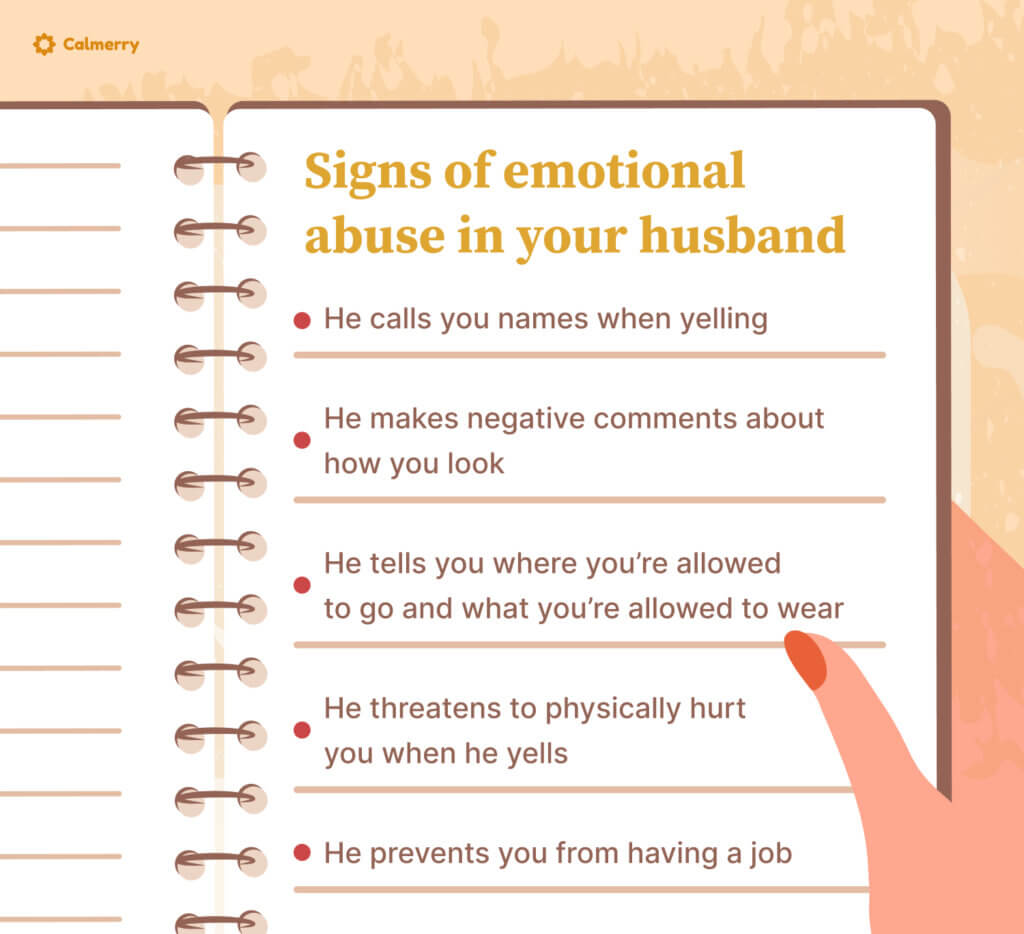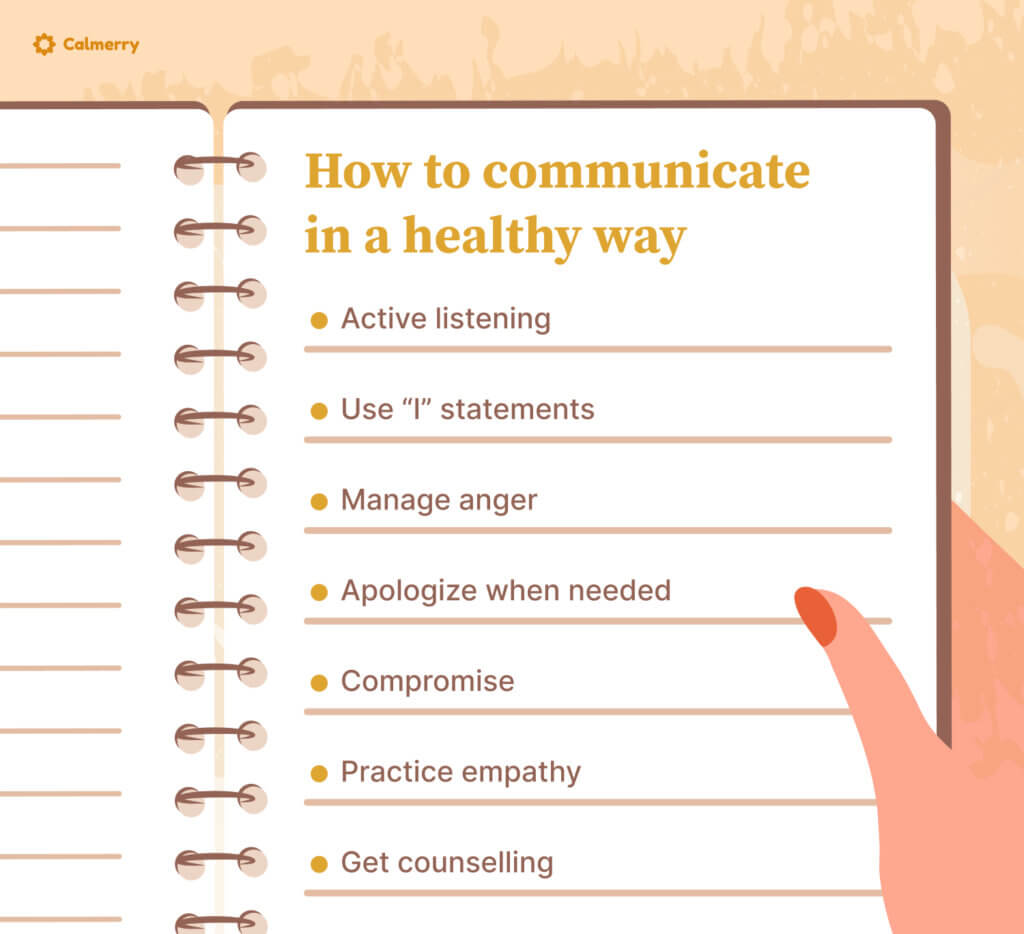My Husband Yells at Me: Reasons and What to Do

In this article
When you find yourself realizing, “My husband yells at me quite often,” it can be rather distressing. You likely feel hurt, alone, and perhaps confused.
Relationships typically don’t thrive with frequent shouting and screaming, so it’s important to get to the bottom of the issue.
If your husband shouts often, there is likely an underlying problem. In many cases, the problem can be solved, so you can return to a state of marital bliss. The good news is that many of these problems can be worked through with the right support. Individual counseling for marriage at Calmerry can provide a safe space to explore these challenges, improve communication, and begin rebuilding trust and connection in your relationship.
Common reasons husbands yell
The underlying causes behind a shouting husband don’t excuse the behavior. However, this can help you understand his behavior a little better and get closer to a solution. Below are some common causes for yelling at a spouse. After learning more about these underlying reasons, you’ll be ready to move toward solutions.
He’s stressed
Not everyone has healthy stress management skills, so if your husband is under a significant amount of stress, he might resort to yelling. A study in the Journal of Family Psychology found that high levels of stress are associated with more conflict between spouses. [1] Timmons, A. C., Arbel, R., & Margolin, G. (2017). Daily patterns of stress and conflict in couples: Associations with marital aggression and family-of-origin aggression. Journal of Family Psychology, 31(1), 93–104. https://doi.org/10.1037/fam0000227
So, if they’re under stress at work or perhaps worried about finances, this may spill over into the marriage.
If your partner refuses to communicate under stress, you might find that they’re yelling at you more often. It could just be that they’re taking their frustration out on you.
Self-doubt and insecurity issues
Underlying insecurity may lead to shouting as a defense mechanism. A husband who feels insecure might interpret situations as personal attacks, triggering a disproportionate response. Shouting becomes a way to gain dominance or control, masking feelings of vulnerability. This can be especially prevalent in situations where he feels his authority or masculinity is being questioned.
Lack of healthy communication skills
Research has shown that issues in the family of origin can contribute to conflict within a marriage. In simpler terms, people who grow up with a significant amount of fighting are more likely to have conflict in their own marriages.
One recent study found that destructive conflict in the family of origin was linked to destructive conflict in marriage. This, in turn, leads to lower marriage quality. [2] Monk, J. K., Ogolsky, B. G., Rice, T. M., Dennison, R. P., & Ogan, M. (2020). The role of family-of-origin environment and discrepancy in conflict behavior on newlywed marital quality. Journal of Social and Personal Relationships, 38(1), 124–147. https://doi.org/10.1177/0265407520958473
What this means is that if your husband grew up in a family with unhealthy conflict resolution strategies, such as screaming and yelling, they’re likely to repeat these behaviors in their marriage with you. They learned to yell by observing this in their own family growing up, and they’re simply handling conflict the way they were taught.
– Dr. Jenni Jacobsen, PhD, Licensed Social Worker (LSW), mental health writer
Mental health issues
Some mental health conditions are linked to difficulties with emotion regulation, which could lead to angry outbursts where a person shouts and screams when he becomes ill.
Research has found that a number of mental health conditions are associated with anger.
Some conditions linked to anger include:
- Depression
- Bipolar disorder
- Generalized anxiety disorder
- Social phobia
- Obsessive-compulsive disorder
- Post-traumatic stress disorder (PTSD)
- Drug and alcohol addictions
Harmful childhood experiences
Childhood experiences significantly shape behavior. If the husband grew up in a household where yelling was a common communication method, he might unconsciously replicate that pattern. Witnessing or experiencing frequent shouting can normalize it as an acceptable form of interaction, making it a default response in adulthood.
He feels threatened
When a husband feels threatened in a relationship, he may react by shouting. This can happen if he feels his sense of self, position of influence, or emotional safety is at risk, regardless of whether the threat is present or just how he interprets the situation. In these instances, yelling can be an instinctive response aimed at reasserting himself or safeguarding his perceived standing within the relationship.
He is prone to misogyny
In some cases, yelling can be a manifestation of misogyny, a deep-seated prejudice against women. A husband who holds misogynistic views might yell as a way to exert power and control over his partner, reinforcing a patriarchal dynamic. This is often rooted in societal and cultural norms that perpetuate gender inequality.
Lack of sleep
Sleep deprivation can lead to moodiness, which could be the reason your husband is yelling at you so often. Lack of sleep has been found to be linked to anger, so if they’re not sleeping well, they may have a short fuse with you.
Evaluate their sleep habits. Do they seem to come to bed late? Do they toss and turn at night?
If they’re not getting proper rest, they’re much more likely to lose their cool during the day.
Emotional dysregulation
Some people have difficulty controlling their emotions. When they feel things like frustration, anger, or even excitement, these feelings can rapidly turn into shouting. This happens because they haven’t learned healthy ways to deal with their emotions, causing them to react with uncontrolled outbursts. Often, this is a behavior they’ve picked up from their environment or experiences.
Reinforcement
This isn’t always the case, but some people who shout and scream at their spouses do so to intimidate and maintain control. If you are frightened by yelling, your husband may choose this behavior because it gives him power.
When you’re fearful of the shouting, chances are you will give in to whatever your husband wants. Therefore, yelling becomes a way to control you and get what he wants out of you.
He continues this behavior because it works for him.
Substance abuse
The next thing when a husband shouts at his wife can be influenced by alcohol or drugs; his ability to think clearly and make good decisions is significantly weakened. These substances can also heighten emotions, making individuals more likely to experience intense anger or aggression. Essentially, the substance act creates volatility in a relationship.

Is yelling in a relationship abuse?
When you’re dealing with a husband who frequently yells, you might begin to ask yourself, “Is yelling abuse?” This is a valid question, and the answer depends on your situation.
We all lose our cool from time-to-time, especially when we’re feeling stressed or frustrated. We might sometimes yell at someone we love, only to feel badly afterwards.
If the yelling is occasional, or it’s a new behavior, it might not be abusive. For instance, perhaps your husband is under stress at work, and they’re starting to become more irritable.
Yelling might be a new behavior in response to increased stress. It could be that they haven’t learned to handle stress well, and they may not even be aware that they’re yelling more.
Or, they could be repeating patterns from their childhood, perhaps subconsciously. They don’t intend to threaten or intimidate you. This doesn’t make the behavior okay, but it isn’t necessarily abusive.
On the other hand, if the yelling is frequent and leaves you fearful and walking on eggshells, it may be a form of emotional abuse. Yelling in and of itself isn’t necessarily abusive, but when it’s frequent and occurs alongside other signs of domestic violence, you could be dealing with domestic abuse.
– Dr. Jenni Jacobsen, PhD, Licensed Social Worker (LSW), mental health writer
Some indicators that yelling is a form of emotional abuse include the following aspects.
Constant criticism
This kind of emotional abuse wears away your self-esteem over time. Your partner might constantly put down your appearance, intelligence, capabilities, or anything else about you. He may make jokes about you, disrespect you, minimize your accomplishments, or compare you with others.
Over time, it may progress from subtle digs to frank insults. In essence, it aims at making one feel small, unsecured, and dependent on him. You will start doubting your worth and perhaps believe their negative portrayal of you, which may lead to low self-esteem. Remember, continuous criticism is not constructive but a manipulative act.
Controlling through threats and intimidation
Emotional abusers threaten and intimidate their partners to get their own way. These threats may be direct (injury to you or loved ones) or indirect (destroying your reputation, leaving you). They may also threaten by yelling or destroying property.
It is supposed to make a person feel unsafe and subordinated. Such situations may create permanent fear and apprehension from not making them irritated. Eventually, the fear allows them to be in the lead and in control of the situation within the relationship.
Isolation from friends and family
This is another sign of emotional abuse. Such husbands often isolate victims from their support systems. They’re extremely jealous when you spend time with your family, so they try to monitor communication or create conflict around socializing. This deliberate tactic increases the victim’s dependence on the abuser, making it harder to seek help or leave the abusive relationship.
Constantly blaming for something
An emotionally abusive husband will never take responsibility and will always blame you for everything that goes wrong. He may accuse you of having an affair when there is no evidence to such a claim, or he may say that you have provoked him into abusing you. He distorts reality to make you feel responsible for his problems and shortcomings. He can also blame you for his inappropriate behavior [3] What is emotional abuse? | The National Domestic Violence Hotline. (2023, July 4). The Hotline. https://www.thehotline.org/resources/what-is-emotional-abuse/ . This blame game that keeps on going makes you so confused, guilty, and responsible for things you have not done. You might start doubting your perception and behavior, and because of this, you will lose self-confidence and become helpless.
Gaslighting
This kind of abuse happens when someone makes you doubt your own reality. They might deny things they’ve said or done or even tell you that you’re imagining things. They want you to question your sanity so that you will have to depend on their version of the events. Such husbands might also blame you for their inappropriate behavior. [4] What is emotional abuse? | The National Domestic Violence Hotline. (2023, July 4). The Hotline. https://www.thehotline.org/resources/what-is-emotional-abuse/
It can really bring serious damage to your mental health, leaving you confused and dependent on the abuser. This is a way of controlling the victim, in which they doubt their mind.
Yelling that occurs alongside the other indicators here is a form of domestic violence. In some cases, emotional abuse can escalate to physical violence.

How yelling impacts you and the marriage
Shouting in a marriage isn’t just about loud voices. It’s a harmful behavior that can seriously damage the relationship. Yelling creates a negative environment with lasting consequences. Here’s a breakdown:
Low self-esteem
Constant yelling makes you feel small and insignificant. Repeated belittling erodes your confidence, leading you to question your value and worth within the relationship and beyond.
Depression and anxiety
Living with yelling creates a state of constant fear and tension. This prolonged stress can trigger anxiety and depression, leaving you feeling emotionally drained and hopeless.
Loss of trust
Shouting breaches the foundation of trust. It signals a lack of mutual respect and safety, making it hard to feel secure and vulnerable, ultimately hindering the ability to confide and connect.
Lack of intimacy
Shouting also creates a hostile environment where emotional and physical intimacy wither. The fear and resentment it breeds build walls, preventing closeness and genuine connection.
Strained relationship
Long-term yelling creates deep wounds in your marriage. It nurtures resentment, erodes love, and creates a chasm of hurt, ultimately damaging the relationship, potentially beyond repair.
Is it okay to yell at your partner?
Although yelling in a relationship is not always a sign of abuse, it’s still not okay to shout at your partner. Even if it’s not abusive, yelling can cause hurt and misunderstandings, so it’s important to communicate calmly.
Talking calmly shows more respect and love. In contrast, yelling can damage trust and create distance between you two. It’s better to discuss problems quietly and kindly.
Everyone makes mistakes, but the only thing that matters is how we handle them. Keeping calm helps solve issues more peacefully.
Protecting yourself and setting clear boundaries
If your husband has been yelling at you, there are several potential solutions to the problem. These are discussed in more detail below.
Make your thoughts clear
There is a chance your husband doesn’t realize that he has been yelling more lately. In this case, it’s important to have a conversation with him.
At a time when you’re both calm, sit them down and tell them that you’ve noticed they’ve been yelling at you quite often. Explain that the behavior isn’t acceptable to you.
– Dr. Jenni Jacobsen, PhD, Licensed Social Worker (LSW), mental health writer
Give them a chance to explain their side of the story. Maybe they’ve been feeling stressed, and they’ve been taking it out on you. Bringing it to their attention gives them an opportunity to correct the behavior.
Don’t react in intense situations
When he shouts, avoid escalating the situation. Take deep breaths, and try to remain calm. Reacting with anger or fear might worsen things. Focus on maintaining your composure, which can help de-escalate the situation and keep you mentally grounded.
Set boundaries
If you’ve talked to your husband about their yelling, and he continues to engage in this behavior, it’s time to set boundaries. Tell him you’re not going to have a conversation with him if he is yelling and screaming.
If a discussion turns into yelling and screaming, walk away from the conversation. Tell him you’d be happy to talk when he is ready to speak calmly and respectfully.
Delay the conversation
If he is too heated, trying to find a common sense with him is likely pointless. Instead, firmly suggest discussing the issue when you’re both calmer. You could say, “I want to talk about this, but I think it’s best if we both cool down first. Let’s talk later this evening.” This sets a boundary and gives you both time to process.
Leave unsafe situations
If your husband’s shouting escalates into threats or physical violence, or you feel unsafe, leave the situation immediately. Go to a place where you feel safe, like a friend’s house, a family member’s, or a public location. Don’t hesitate to call for help if needed.
Establish ground rules
When you’re both calm, try to establish ground rules for future disagreements. This might include agreeing that yelling is unacceptable, taking breaks when things get heated, and expressing your feelings about this.
Limit reinforcement
When the spouse shouts at you, it is important not to give in to demands made at this time or try to appease him to calm him down. This can be difficult, especially if the husband’s outburst aims to get you to do something, but you may unintentionally reinforce his yelling behavior if you agree at this time.
Create a safety plan
When yelling occurs in the context of domestic violence, the most important thing you can do is keep yourself safe. Develop a plan for how you will stay safe if yelling escalates to violence.
This could involve going to another room of the house, seeking help from the neighbors, or calling a trusted friend or family member.
It is helpful if you can seek support from friends or family. If domestic abuse is a concern, confide in someone you can trust. This should be someone who is willing to take a phone call from you at any time if you’re in danger.
If you’re not sure where to turn, the National Domestic Violence Hotline offers resources, including a 24-hour phone and text hotline. Remember, you should never have to tolerate abuse.
Seek individual counseling for him
Yelling could be a sign of a mental health disorder, such as depression or anxiety. It could also be an indicator that your husband didn’t learn healthy conflict-resolution skills from his own parents.
In either case, counseling can help him to correct his behavior. A counselor can work with your husband individually to help him develop healthier coping skills and communication patterns.
Evaluate your own behavior
Sometimes, yelling can be a pattern that occurs in both partners in a relationship. It’s possible that you and your husband have both been using yelling as a way to express yourself during conflict.
If you realize that you’re also a yeller, it’s important for you to make an effort to handle conflict in a healthier manner. Have a discussion with your husband to devise solutions for how you can both stop yelling when you have a disagreement. You might agree to take a moment to calm down before having a heated discussion.
Work together to get the best solution
When you work together, you can find healthier ways to communicate. It helps both of you understand each other’s feelings better. Talking calmly can prevent more arguments.
Finding a solution together shows respect for each other’s needs. It also helps build trust in the relationship.
Engaging with your partner can make your relationship stronger. It’s important to listen to each other’s concerns. Being patient and kind can help solve the problem. Working together makes sure both of you feel valued and heard.
Learning to communicate in a healthy way
Use “I” statements
When expressing yourself, focus on “I” statements. This means expressing your feelings and experiences without blaming others. Instead of saying, “You always do this,” try, “I feel hurt when this happens because…” By owning your emotions, you open up a space for productive dialogue.
Listen actively
Pay attention to the husband’s tone of voice and body language. Reflect back on what you hear to ensure understanding. Ask clarifying questions. Show that you’re engaged and genuinely interested in what he has to say.
Manage anger appropriately
Anger is a natural emotion, but how you manage it matters. When you feel anger rising, take a step back. Recognize the triggers and practice calming techniques like deep breathing.
Compromise
In any relationship, you won’t always see eye-to-eye. Learning to compromise is important. This means finding a middle ground where both parties feel heard and respected. Be willing to meet halfway and consider alternative solutions.
Get counselling
If you feel like you need a helping hand or are struggling to communicate effectively, please reach a specialist. A therapist can provide you with tools and strategies to navigate difficult conversations and build healthier relationships.
Practice empathy
It’s important to understand and share the feelings of another. Try to put yourself in the other person’s shoes. Consider their perspective, even if you don’t agree with it. When you respond, do so with compassion and understanding.
Apologize when needed
We all make mistakes. A sincere apology can go a long way in repairing damage and restoring trust. When you realize you’ve hurt someone, take responsibility for your actions and offer a genuine apology. It’s okay to apologize. Thus, you show your partner that you care about them and their feelings.

Self-care and healing
Spend time doing activities you enjoy
Engage in hobbies that bring you joy and relaxation. Whether it’s reading, gardening, creating art, or simply listening to music, prioritize activities that nurture your soul and make you feel alive.
Connect with supportive friends and family
Surround yourself with loved ones who uplift and understand you. Share your feelings, laugh together, and lean on their support during challenging times. These connections provide a vital sense of belonging and comfort.
Practice self-compassion
Treat yourself with the same kindness and understanding you’d offer a friend. Acknowledge your struggles without judgment, forgive your imperfections, and remember that you are worthy of love and care, especially from yourself.
Take care of your physical wellness
Nourish your body with healthy foods, regular exercise, and adequate sleep. Physical well-being significantly impacts mental and emotional health. Even small steps like a short walk or a mindful meal can make a difference.
Consider sessions with a trained therapist
A therapist can help you to process emotions, develop coping strategies, and gain valuable insights into your inner world. Don’t hesitate to seek professional help when navigating difficult periods.
Set healthy boundaries
Learn to say “no” to commitments that drain your energy or compromise your well-being. Protect your time and emotional space. Establishing boundaries fosters self-respect and prevents burnout, allowing you to focus on what truly matters.
Overcoming codependency
If your husband is yelling, it’s important to prioritize your safety and well-being. Codependency can involve prioritizing his needs over yours, making it hard to set boundaries. Start by recognizing your own needs and feelings and building self-esteem. Remember, you deserve respect and kindness.
Final thoughts
When yelling in a marriage becomes an ongoing problem, professional support can be helpful. Working with a mental health professional, both as a couple and individually, can reduce the yelling.
As a couple, you can work together with a therapist to learn strategies for managing conflict and communicating effectively. Individual therapy for relationship issues can also be beneficial, especially if your husband is experiencing a personal problem, such as stress or a mental health issue, that makes it difficult for them to cope under stress.
At Calmerry, we offer individual online therapy and counseling services. While we do not offer couples counseling at this time, we can work with you or your husband individually.
Start with a brief survey – and get matched with a professional within 1 hour.
FAQ
What are signs my husband’s yelling is verbal abuse?
If one partner shouts, and it includes insulting and vicious personal attacks, or is intentionally emotionally cruel, it qualifies as abusive. If your spouse sees shouting as a way to control you and actively discourages you from seeing loved ones or your husband, these are red flags. Ask yourself: Does the shouting feel dangerous, and are you walking on eggshells in your own home? If you feel unsafe, it’s time to take action.
Why does my husband yell at me for no reason?
While we’ve all experienced shouting that happens during an argument, living with a husband who regularly engages in yelling can seem like it’s for no reason. Potential causes your husband raises his voice include a lack of self-control, stress, or unresolved issues. He may feel threatened or insecure about his value and importance in the relationship. It could also stem from disorders like depression or substance abuse. While these stressors are understandable, they don’t excuse taking it out on you.
How should I respond when my husband shouts at me?
Don’t shout back. Your natural reaction may be to defend yourself but try to remain calm. Establish clear boundaries. You can say, “I’m willing to talk when we can both speak calmly.” If the shouting persists and you feel unsafe, calmly leave the room.
How do I get my husband to stop yelling when angry?
You can’t control your husband’s actions, and trying to change one partner isn’t always effective. Focus on what you can control. Encourage him to explore anger management techniques or consider individual counseling. He may need to learn relationship dynamics and how to deal with stress.
What should I do when my husband yells at me?
Prioritize your needs come first. Don’t try to handle this alone. Consider counseling and support yourself to process the emotional impact. Document instances of shouting to help identify patterns.
What are the psychological effects of yelling?
The psychological effects of yelling can be significant. Frequent shouting can lead to increased stress, anxiety, and depression. It can also cause overall relationship damage and create an imbalance of power in the relationship. You may experience intense mood swings or feel like you’re losing your sense of self.
When are couples counseling recommended for yelling?
Couples counseling is recommended when one partner yells, negatively impacting the relationship. If attempts to resolve the issue independently have failed, or you want to boost communication skills, seek professional help.
How do you protect yourself from a yelling spouse?
If you feel threatened, have a plan to leave to protect yourself. Lean on loved ones and build a support network. Seek out domestic violence resources like SOS Violence Conjugale or a similar organization in your area.
Can therapy help if my husband shouts at me?
Individual therapy can help your husband address the root causes of his anger. He may need substance abuse counseling or support for disorders like depression. You can also benefit from therapy to process the emotional impact of his yelling and learn coping mechanisms.
When should I consider leaving a relationship with a yelling partner?
Consider leaving a relationship when the yelling is abusive, your safety is at risk, or your partner is unwilling to change. If the yelling persists despite attempts at intervention and it’s causing significant emotional distress, it may be time to leave.
Timmons, A. C., Arbel, R., & Margolin, G. (2017). Daily patterns of stress and conflict in couples: Associations with marital aggression and family-of-origin aggression. Journal of Family Psychology, 31(1), 93–104. https://doi.org/10.1037/fam0000227
Monk, J. K., Ogolsky, B. G., Rice, T. M., Dennison, R. P., & Ogan, M. (2020). The role of family-of-origin environment and discrepancy in conflict behavior on newlywed marital quality. Journal of Social and Personal Relationships, 38(1), 124–147. https://doi.org/10.1177/0265407520958473
What is emotional abuse? | The National Domestic Violence Hotline. (2023, July 4). The Hotline. https://www.thehotline.org/resources/what-is-emotional-abuse/
What is emotional abuse? | The National Domestic Violence Hotline. (2023, July 4). The Hotline. https://www.thehotline.org/resources/what-is-emotional-abuse/
online therapy
live video session



